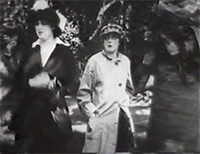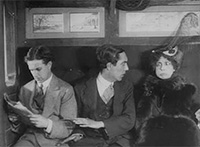Introduction
Blackbird looks back 100 years through the lens of three women filmmakers—Helen Holmes, Mabel Normand, and Florence Turner—who were active in the early film industry as actors, writers, directors, and producers.
The nickelodeon boom, beginning in 1905, brought demand for short one-reel films. This demand corresponded to an influx in women taking increasingly active roles in film. Many began working as actors for film studios, which opened up opportunities for writing and directing—often collaborative processes that were not always credited. Some women—including all three featured here—would go on to start their own studios.
The Hazards of Helen, Mabel's Blunder, and Daisy Doodad's Dial, made at different points in each woman's career, show the variety of ways women helped shape the film industry and public discourse in an era of world war and the suffragist movement. Though these three short films are not overtly feminist, they do demonstrate some of the ways in which women in film called into question assumptions about what women could or should do.
 |
|
Helen Holmes as Helen in The Escape on the Fast Freight gives a new version of women’s roles in action films, in dangerous situations, and in the workplace. The Escape on the Fast Freight was one of 119 twelve-minute episodes in The Hazards of Helen series, produced by Kalem Company in order to compete with Eclectic Film Company’s popular Perils of Pauline series. Unlike Pauline, who frequently had to be rescued from her perils, Helen often took down bad guys single-handedly and rescued men from trouble.
Holmes, who grew up around the railroad, performed her own stunts and, in the short shown here, jumps from bridge to moving train, tackles the villain on top of the train, and leaps from the train into the water below.
 |
|
The movie’s action is framed by Helen’s dismissal from her job as night operator after the station is robbed by two tramps. Her male replacement brings a letter from the superintendent which informs: “Effective to-day: Male operators only will be assigned to Ferndale Station on account of recent robbery.” Not only does Helen’s job present inherent danger, but she also lacks job security because of the assumption that a man would be less susceptible to robbery. Helen’s action in the film questions this assumption and shows that even if she is susceptible she can (and is desperate enough to keep her job to) fight the bad guys to get the station’s money back. In a reversal of roles, she returns to the Ferndale station with a letter, which informs the replacement operator, “Effective to-day: Miss Helen Holmes will take over night trick at Ferndale Station. After ten days vacation please turn station over to her.”
Mabel Normand wrote, directed, and starred in Mabel’s Blunder, in which she presents an unusual combination of traditional femininity engaged in physical comedy. The plot is stereotypical in certain regards: Mabel’s misplaced jealousy of her fiancé’s sister leads her in a series of seemingly ridiculous blunders. Still, Mabel’s comedic blunders include cross-dressing and physical slapstick, which were unusual representations for female comedians who also presented themselves as feminine.
 |
|
Florence Turner, director and star of Daisy Doodad’s Dial, also owned the film company which produced it. In this short, Turner’s character faces social expectations of femininity that lead to her arrest after gurning (making faces) in public en route to a face-making competition. Other characters believe Daisy incapable of making such ridiculous faces and are horrified once she does. But Daisy is not convinced by others’ discomfort, gurning despite the consequences and taking to task the men who try to restrain her. Ultimately, Daisy decides she prefers her own company and, despite having nightmares of her own made-faces, she concludes by mugging the camera, unapologetically making faces at her 1914—and 2014—audiences. ![]()
Contributor’s Notes: Helen Holmes
Contributor’s Notes: Mabel Normand
Contributor’s Notes: Florence Turner
1914 Women in Film Suite Introduction
Acknowledgments